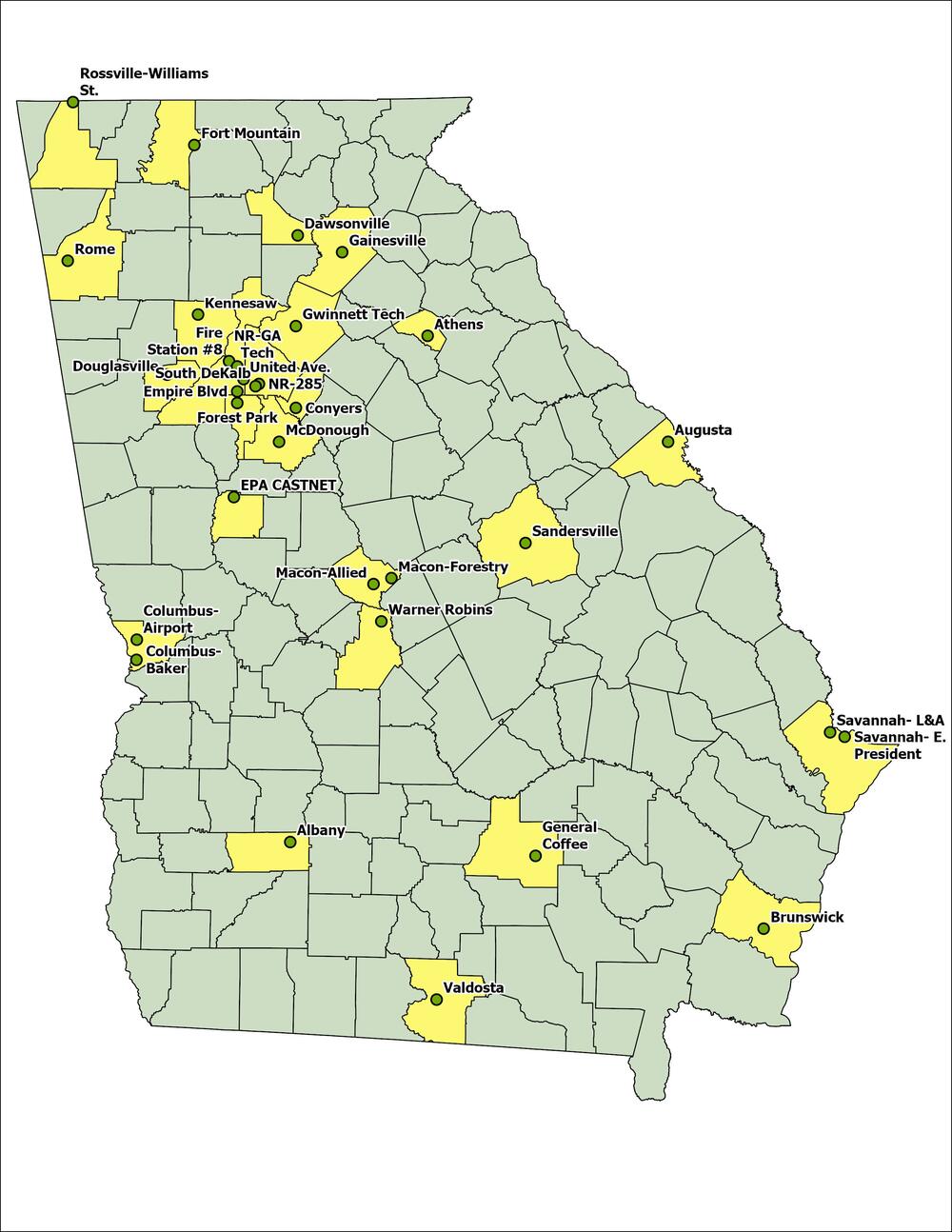
Monitoring and Keeping Your Air Clean
Georgia’s Air Monitoring Program
The Air Protection Branch of the Georgia Environmental Protection Division has been monitoring air quality in the state of Georgia for more than forty years. During this time, the list of monitored compounds has grown to more than 200 pollutants at 34 sites in 25 counties across the state.

34 sites located in 25 counties (yellow) throughout Georgia, measuring for 200 pollutants statewide.
Collecting Air Samples and Data
We carefully collect and test the air samples to determine the concentration of each pollutant. We take measurements under very strict protocols, using highly technical equipment, to ensure that the data we produce is accurate. The field equipment also undergoes rigorous testing, calibration and maintenance.
Assuring that the Data is Accurate
To ensure precise data, we validate the data by conducting field tests on the sampling equipment. If the quality audit fails, we repair or replace the instrument before the next sample is taken.
Making the Data available
Live data from the air monitors is available on Air Georgia, where hourly monitoring data is posted for key pollutants. The live map shows you the air quality in your area based on actual measurements. We also submit data to EPA’s national database AIRNOW for use by EPA, researchers, and health professionals. In addition, the data is summarized in our Annual Monitoring Report. We use the data collected to determine if we are attaining the National Air Quality Standards.
Weather affects air quality
Weather affects air pollution. For instance, sunlight and heat can promote ozone formation. Temperature inversions can prevent pollution from dispersing. For this reason, we have meteorologists, a staff that manages a network of over 15 meteorological stations located throughout Georgia.
“Smog Alerts”
Using weather information as well as the pollution data collected from the monitors, a forecast team produces a daily ozone and fine particulate pollution forecast or “smog alert” for metro Atlanta, Macon, and Columbus. With the use of the air quality index or AQI, this forecast allows citizens who are sensitive to air pollution to plan their day and limit their exposure.
How We Keep Your Air Clean
We measure air quality across Georgia by operating and maintaining a network of monitoring sites all throughout our state. We share the air quality data we collect, forecast the Air Quality Index of the day, and produce an annual report on the state of air quality in Georgia at our air monitoring website.
We develop state implementation plans (SIP) required by the Clean Air Act that explain how we intend to comply with the most recent National Ambient Air Quality Standards (NAAQS). Air quality planning and rulemaking allows us to improve air quality in Georgia strategically by allocating the right resources to address the most pressing air pollution problems. The plans are approved by the US EPA and often require advanced technical demonstrations that include air quality modeling, monitoring, and rule development activities.
We issue permits and inspect stationary sources of air emissions such as industries and power plants to make sure they comply with all state and federal air pollution requirements. We verify facility emission and testing information to make sure it is accurate and complies with state and federal standards.
We investigate complaints and violations of state and federal air quality laws and regulations.
We oversee a vehicle emissions testing program that covers 13-counties where ground-level ozone is high.